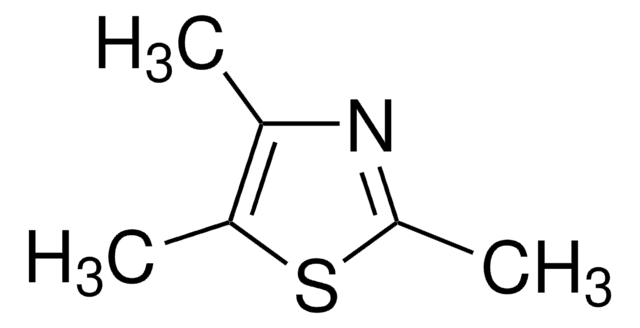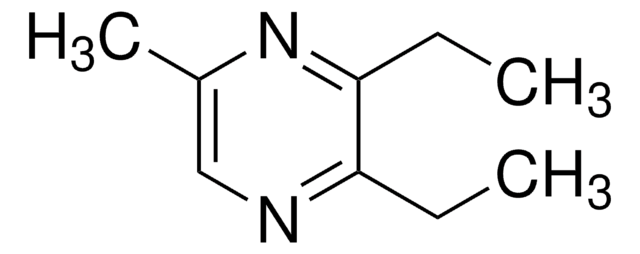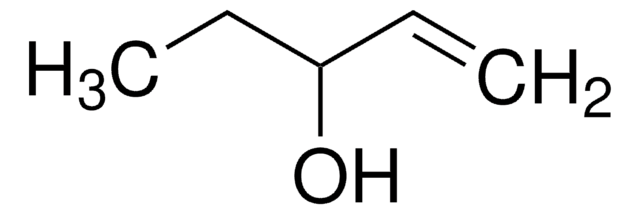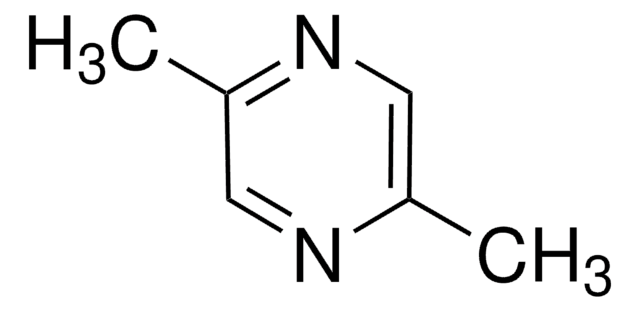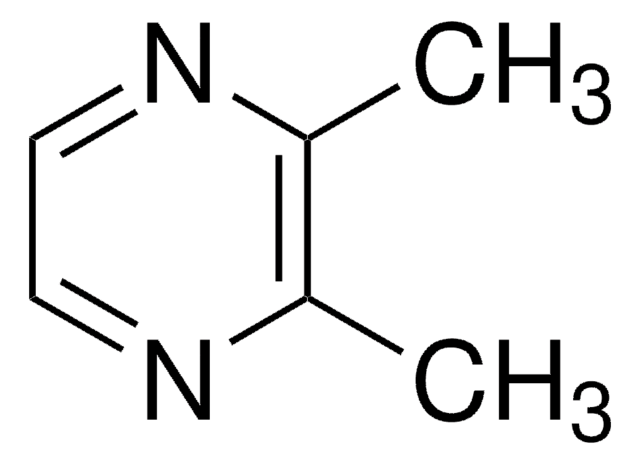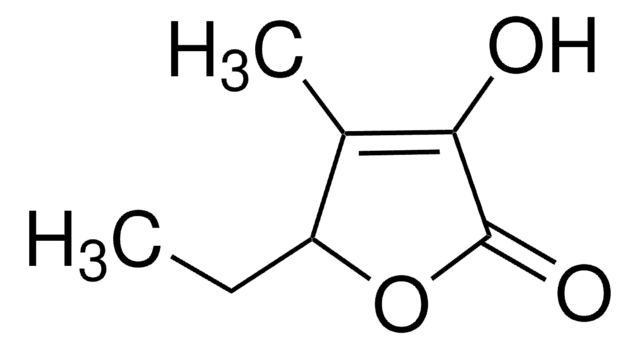W314900
2-Ethyl-3(5 or 6)-dimethylpyrazine, mixture of isomers
≥95%, FG
Synonym(s):
2-ethyl-3,5(or 6)-dimethylpyrazine
About This Item
Recommended Products
biological source
synthetic
Quality Level
grade
FG
Fragrance grade
Halal
Kosher
Agency
follows IFRA guidelines
reg. compliance
EU Regulation 1223/2009
EU Regulation 1334/2008 & 178/2002
Assay
≥95%
refractive index
n20/D 1.5015 (lit.)
bp
180-181 °C (lit.)
density
0.965 g/mL at 25 °C (lit.)
application(s)
flavors and fragrances
Documentation
see Safety & Documentation for available documents
food allergen
no known allergens
fragrance allergen
no known allergens
Organoleptic
chocolate; hazelnut; nutty; peanut; roasted
SMILES string
CCc1ncc(C)nc1C.CCc2nc(C)cnc2C
InChI
1S/2C8H12N2/c1-4-8-7(3)10-6(2)5-9-8;1-4-8-7(3)9-5-6(2)10-8/h2*5H,4H2,1-3H3
InChI key
BOFLOMVCGPWPQC-UHFFFAOYSA-N
Looking for similar products? Visit Product Comparison Guide
General description
Application
- Characterization of Flavor Profile of Sauced Pork from Different Regions of China Based on E-Nose, E-Tongue and Gas Chromatography-Ion Mobility Spectroscopy.: This study by Yuan et al. characterizes the flavor profile of sauced pork using various sensory and chromatographic techniques, including gas chromatography-ion mobility spectroscopy. It identifies key aroma compounds, including 2-ethyl-3,5(6)-dimethylpyrazine, contributing to the overall flavor profile (Yuan et al., 2024).
- The effect of thermal times of circulating non-fried roast technique on the formation of (non)volatile compounds in roasted mutton by multi-chromatography techniques and heat transfer analysis.: Liu et al. explore how different thermal processing times affect the formation of volatile and non-volatile compounds in roasted mutton, highlighting the presence of 2-ethyl-3,5(6)-dimethylpyrazine among the key aroma contributors (Liu et al., 2023).
- Investigation of the effect of over-fired drying on the taste and aroma of Lu′an Guapian tea using metabolomics and sensory histology techniques.: Zhang et al. investigate how over-fired drying affects the aroma and taste of Lu′an Guapian tea, identifying 2-ethyl-3,5(6)-dimethylpyrazine as a significant aroma compound (Zhang et al., 2024).
- Unveiling the aromatic intricacies of Wuyi Rock Tea: A comparative study on sensory attributes and odor-active compounds of Rougui and Shuixian varieties.: This comparative study by Wang et al. examines the sensory attributes and odor-active compounds of Wuyi Rock Tea, highlighting the role of 2-ethyl-3,5(6)-dimethylpyrazine in the aroma profile (Wang et al., 2024).
- Characterization of the Key Aroma Compounds in Dong Ding Oolong Tea by Application of the Sensomics Approach.: Wang et al. characterize the key aroma compounds in Dong Ding Oolong tea, identifying 2-ethyl-3,5(6)-dimethylpyrazine as one of the major contributors to its distinct aroma profile (Wang et al., 2023).
Biochem/physiol Actions
Other Notes
Signal Word
Warning
Hazard Statements
Precautionary Statements
Hazard Classifications
Acute Tox. 4 Oral - Eye Irrit. 2 - Skin Irrit. 2 - STOT SE 3
Target Organs
Respiratory system
Storage Class Code
10 - Combustible liquids
WGK
WGK 3
Flash Point(F)
156.2 °F
Flash Point(C)
69 °C
Personal Protective Equipment
Regulatory Listings
Regulatory Listings are mainly provided for chemical products. Only limited information can be provided here for non-chemical products. No entry means none of the components are listed. It is the user’s obligation to ensure the safe and legal use of the product.
FSL
Group 4: Flammable liquids
Type 2 petroleums
Hazardous rank III
Water insoluble liquid
JAN Code
W314900-VAR-K:
W314900-250G-K:
W314900-100G-K:
W314900-1KG-K:
W314900-BULK-K:
W314900-100G:
W314900-1KG:
W314900-250G:
W314900-SAMPLE-K:
W314900-SAMPLE:
Choose from one of the most recent versions:
Already Own This Product?
Find documentation for the products that you have recently purchased in the Document Library.
Customers Also Viewed
Our team of scientists has experience in all areas of research including Life Science, Material Science, Chemical Synthesis, Chromatography, Analytical and many others.
Contact Technical Service